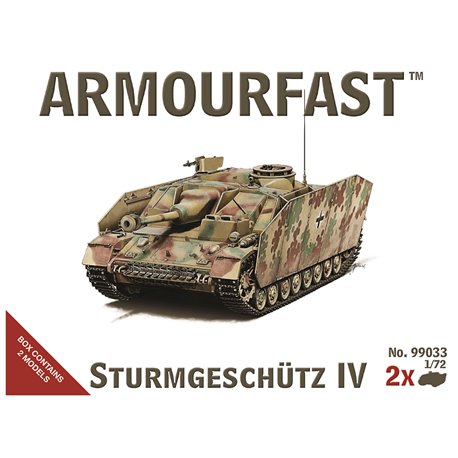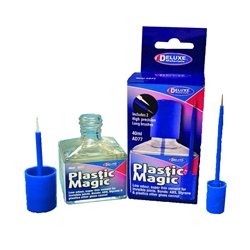No products
 View larger
View larger Sturmgeschutz IV (x2) 1/72 Tank plastic kit (DE)
DISC**arm99033
New product
Sturmgeschutz IV (x2) 1/72 Tank plastic kit (DE)
The StuG IV was a World War 2 German “Assault Gun” based on the chassis of the widely used Panzer IV. Deployed in infantry divisions alongside soldiers to provide support fire and anti-tank capabilities. Fighting on the Eastern and Western fronts, as well as in Italy...
This product is no longer in stock
More info
Sturmgeschutz IV (x2) 1/72 Tank plastic kit (DE)
The StuG IV was a World War 2 German “Assault Gun” based on the chassis of the widely used Panzer IV. Designed to supplement the StuG III already in service, the StuG IV was deployed in infantry divisions alongside soldiers to provide support fire and anti-tank capabilities. Fighting on the Eastern and Western fronts, as well as in Italy, the StuG IV was a powerful force to be reckoned with!
However, that simplifies things, somewhat, as the story behind the StuG IV is somewhat more chaotic.
It began life in the shadow of the successful StuG III. The Krupp company was, at the time, responsible for producing the Panzer IV and by 1943, was producing the Ausf.G/H At the same time Alkett was producing the Sturmgeschütz III (by now in the Ausf.G version) slowly entering service on the Eastern Front.
In 1943, a merging of the Stug III superstructure (slightly lengthened) set upon the Panzer IV chassis was proposed, but it was dropped as being too heavy. In August 1943, Hitler was given reports on the performance of the StuG III at the battle of Kursk, which pointed out relatively superior performances of the StuG III Ausf.G compared to the Panzer IV. He ordered Krupp to switch production to a dedicated tank-hunter, the Panzerjäger IV, that would be equipped with the same 7.5 cm L/70 used by the Panther.
Soon after, Vomag produced a prototype of the Panzerjäger IV, equipped with the 7.5 cm L/70 in October 1943, and the vehicle entered mass-production. However, this long gun was very scarce, and supply problems let to the first models mounting the 7.5 cm L/48. At the same time, the StuG III production was virtually stopped by Allied bombings in November-December 1943. Krupp prepared a new drawing, using the same kind of superstructure on Alkett’s design. It emerged as cheaper and easier to manufacture than the Jagdpanzer IV and Krupp was given the green light after a demonstration to Hitler on 16-17 December 1943. The production of the StuG IV started immediately.
The Panzer IV chassis used was the Ausf.H and it was married with Alkett’s StuG III Ausf.G superstructure, with the addition of a box compartment for the driver. This hybrid construction meant that production could be set up quite quickly.
The crew comprised four men, with the commander in the hull left rear, gunner on the left center, loader on the right rear and the driver in the hull left front. The rotatable commander’s cupola received eight vision blocks. Maximum armour thickness was reached on the superstructure front, with an 80 mm (3.15 in) thick welded plate. The gun mantlet was of the “Saukopf”, or “pig snout”, type. The gun itself was the usual 7.5 cm StuK 40 L/48 with 63 rounds in store. There was no machine-gun, but the need for a close defence weapon urged the adoption of a shielded MG 34 fitted on a ring mount around the loader’s hatch, with 600 rounds of ammunition.
Production spanned three years, from December 1943 to May 1945, when Germany capitulated, with a total of 1,108 plus 31 conversions from damaged Panzer IVs (1141 total). The Ordnance department called it the Sd.Kfz.167. There were no Ausfuehrungs (variants), but modifications included Zimmerit paste (not for long), shielded MG 34 on the roof and spaced armour (Schurzen).
The StuG IV was seen as a supplement to the lack of StuG IIIs in the beginning, and was deployed with the same infantry divisions and used tactically in the same way. It was an equally efficient tank hunter. Tests were also made with the 75 mm (2.95 in) L/70 gun, which were not concluded. Apparently, no StuG IVs were used by the German allies except the Hungarian army. By far, most were used on the Eastern Front and eastern Europe, then Germany in 1945. They also soldiered in Italy, after a demonstration was made to Field Marshal Albert Kesselring (Army Group C) in 1944, in Normandy in the summer of 1944, as well in the Ardennes offensive of December 1944.



